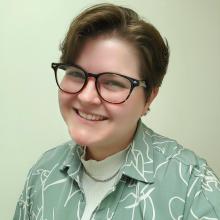Member Spotlight: Emily Herry, Ph.D.
Postdoctoral Research Scholar, College of Nursing Center for Healthy Aging, Self-Management, and Complex Care, The Ohio State University; SRCD SOGIE Caucus Steering Committee Student and Early Career Representative and Communications Committee Member
Why did you decide to choose developmental science as a course of study or career?
I was always interested in the role of context in people’s lives (e.g., their health and development), however, I was not sure how that translated into a career. I took my first psychology class at Alamance Community College (ACC), and, as they say, the rest was history. I fell in love with the discipline and took all the psychology classes that ACC had to offer (only three classes at the time), including an introduction to lifespan development class. At the time I was not a psychology major, but upon transferring to UNC – Greensboro to complete my undergraduate career, that changed. During my first year at UNC – Greensboro, I started working in the Development and Understanding of Children’s Knowledge (DUCK) Lab as an undergraduate research assistant, my first real exposure to working in a lab setting. During my time in the lab, my interest in developmental psychology grew, and I knew that I was interested in the role of context in developmental processes. With that in mind, I applied for Ph.D. programs in developmental psychology, and chose to attend North Carolina State University for my Ph.D. in lifespan developmental psychology. I now work as a postdoctoral research fellow where I utilize what I learned during my Ph.D. in lifespan developmental psychology to study contextual and stigma-related stressors that impact identity development and contribute to mental health outcomes among LGBTQ+ individuals.
Is there a mentor or mentors who have been instrumental to your studies and career path so far, and, if so, who and how?
I have been very fortunate to have a group of amazing mentors throughout my career. During my undergraduate degree I was exposed to conducting research by working with Drs. Janet Boseovski and Stuart Marcovitch in the DUCK Lab. This experience provided me with the tools necessary for success going into my PhD. During my Ph.D., my mentor, Dr. Kelly Lynn Mulvey, was fully supportive of me both professionally and interpersonally. During my Ph.D. I became interested in conducting research related to sexual and gender diverse health and development. Despite this not being her own area of research, she was supportive as I made connections with others who studied similar topics and learned how to navigate that research space. Finally, my postdoc research mentor, Dr. Christina Dyar, has been incredibly supportive of me, teaching me about Intensive Longitudinal Design research and supporting me as I pursue my goals.
What advice would you give to a prospective graduate student thinking about beginning their Ph.D. studies in the developmental science field?
There is a lot to think about before starting your Ph.D. in any field, including in developmental sciences. Broadly, one of the biggest things to keep in mind is that you do not need to have everything figured out right away. It is okay if your research interests change, that is totally normal. Additionally, one of the most important things to keep in mind is mentorship fit. Will the prospective mentor be a good fit for you (e.g., mentorship style)? Do you have similar goals for your Ph.D. journey (e.g., number of publications, timeline)? How can this potential mentor support you (i.e., professionally, interpersonally)? Does this mentor publish with their graduate students? How will your mentor support you in attaining additional funding (e.g., applying for grants)? These are all questions to keep in mind as you apply for and begin your Ph.D.
What is your best SRCD memory?
One of my best SRCD memories is attending SRCD 2023 in Salt Lake City, Utah. As most of my Ph.D. occurred over the global pandemic, many of the connections I made with other people occurred through online conferences or Zoom meetings. SRCD 2023 was only my third in person conference during my Ph.D., and it was so lovely to meet people such as Alaina Brenick, Jessica Fish, Laura Baams, and other amazing SOGIE scholars in person for the first time!
Why did you join the SOGIE Caucus and how does it facilitate connection among members all year long
I joined the SOGIE caucus because of a cup of coffee. The first time I interacted with people within the SOGIE caucus was during the virtual SRCD 2021 Biennial. The SOGIE caucus was hosting a coffee hour and I decided to attend. During this coffee hour I was in a breakout room with Alaina Brenick, who was showing off her panda coffee mug. I really connected with her and the other scholars during that meeting, and that is what made me want to join the SOGIE caucus. The caucus is a great place to find support among people who identify as queer, who study SOGIE topics, or both. I regularly email or meet with people in the caucus during the year, from casual ‘catching up’ hangouts to working on projects together, the SOGIE caucus is a great source of interpersonal and professional connection.
